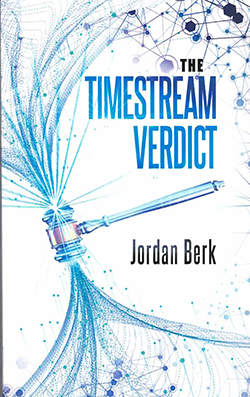The Timestream Verdict by Jordan Berk; Huntsville, North Carolina: Ingram Elliott, Inc. publishers; © 2024; ISBN 9781952-961267; 269 pages; $19.99.

 SAN DIEGO – Enjoy the excitement of this year’s playoff and World Series baseball while they last. There won’t be any such games in a future after time travel is perfected. What would be the point? Everyone by time-traveling to the day after an upcoming game would know and publicize the score. Sports betting would be put out of business. So too will it be for all professional sports. Not to mention the stock market.
SAN DIEGO – Enjoy the excitement of this year’s playoff and World Series baseball while they last. There won’t be any such games in a future after time travel is perfected. What would be the point? Everyone by time-traveling to the day after an upcoming game would know and publicize the score. Sports betting would be put out of business. So too will it be for all professional sports. Not to mention the stock market.
That’s one of the conclusions that Jewish author Jordan Berk forecasts if time travel ever became a reality. He mentions it in passing. The real thrust of his science fiction novel is how complicated life could become if people could zip into the past or the future.
Aaron Barnett, a non-descript accountant living in Chicago in 1985, is unceremoniously transported to the United Nations building in the year 2042 where he is informed that he and 11 other people from various times and places have been selected to serve on a jury in which a scientist of that era is accused of having gone back in time to murder Kathryn Simpson, a UC Berkeley physicist uncelebrated in her time but later revered as “the mother of time travel.”
The defendant, Jakob Olsen, readily admits that he traveled back in time to Simpson’s home in 1988 but claims it was to try to prevent her death, not to kill her. After the jury reaches its verdict, Aaron and the others are teleported back to their homes, arriving at the exact minute and date they had been abducted. Their memories were supposed to be wiped clean of their time in the future, but Aaron remembers every detail. What if he can prevent Simpson’s death, now three years in the future?
The novel provides a perhaps too ambitious picture of future New York City, given that he year 2042 is only 18 years from now. Computerized walls catering to hotel guests’ every need may seem too fantastic; roadways filled with automatic cars able to avoid “classic” cars with errant drivers seems feasible; but standardized time travel, to this reader, appears to be a pipe dream, at least so soon.
Nevertheless, author Berk’s vision of the future – a mixed utopia and dystopia – makes for compelling and suspenseful reading.
*
Donald H. Harrison is publisher and editor of San Diego Jewish World.